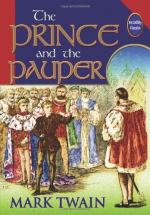“If the King’s grace please, it did appear upon the trial that this man entered into a house in the hamlet of Islington where one lay sick—three witnesses say it was at ten of the clock in the morning, and two say it was some minutes later—the sick man being alone at the time, and sleeping—and presently the man came forth again and went his way. The sick man died within the hour, being torn with spasms and retchings.”
“Did any see the poison given? Was poison found?”
“Marry, no, my liege.”
“Then how doth one know there was poison given at all?”
“Please your Majesty, the doctors testified that none die with such symptoms but by poison.”
Weighty evidence, this, in that simple age. Tom recognised its formidable nature, and said—
“The doctor knoweth his trade—belike they were right. The matter hath an ill-look for this poor man.”
“Yet was not this all, your Majesty; there is more and worse. Many testified that a witch, since gone from the village, none know whither, did foretell, and speak it privately in their ears, that the sick man would die by poison—and more, that a stranger would give it—a stranger with brown hair and clothed in a worn and common garb; and surely this prisoner doth answer woundily to the bill. Please your Majesty to give the circumstance that solemn weight which is its due, seeing it was foretold.”
This was an argument of tremendous force in that superstitious day. Tom felt that the thing was settled; if evidence was worth anything, this poor fellow’s guilt was proved. Still he offered the prisoner a chance, saying—
“If thou canst say aught in thy behalf, speak.”
“Nought that will avail, my King. I am innocent, yet cannot I make it appear. I have no friends, else might I show that I was not in Islington that day; so also might I show that at that hour they name I was above a league away, seeing I was at Wapping Old Stairs; yea more, my King, for I could show, that whilst they say I was taking life, I was saving it. A drowning boy—”
“Peace! Sheriff, name the day the deed was done!”
“At ten in the morning, or some minutes later, the first day of the New Year, most illustrious—”
“Let the prisoner go free—it is the King’s will!”
Another blush followed this unregal outburst, and he covered his indecorum as well as he could by adding—
“It enrageth me that a man should be hanged upon such idle, hare-brained evidence!”
A low buzz of admiration swept through the assemblage. It was not admiration of the decree that had been delivered by Tom, for the propriety or expediency of pardoning a convicted poisoner was a thing which few there would have felt justified in either admitting or admiring—no, the admiration was for the intelligence and spirit which Tom had displayed. Some of the low-voiced remarks were to this effect—




